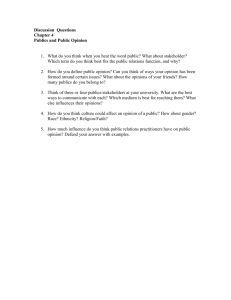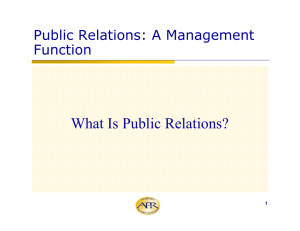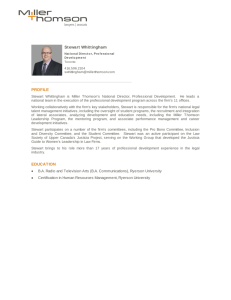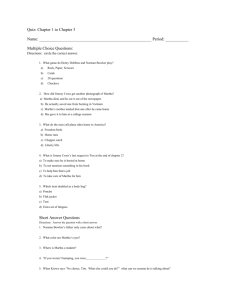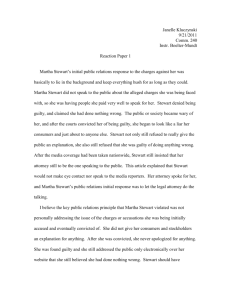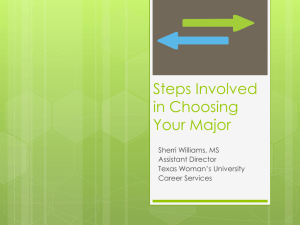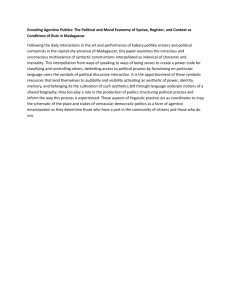public relations - Direktori File UPI
advertisement
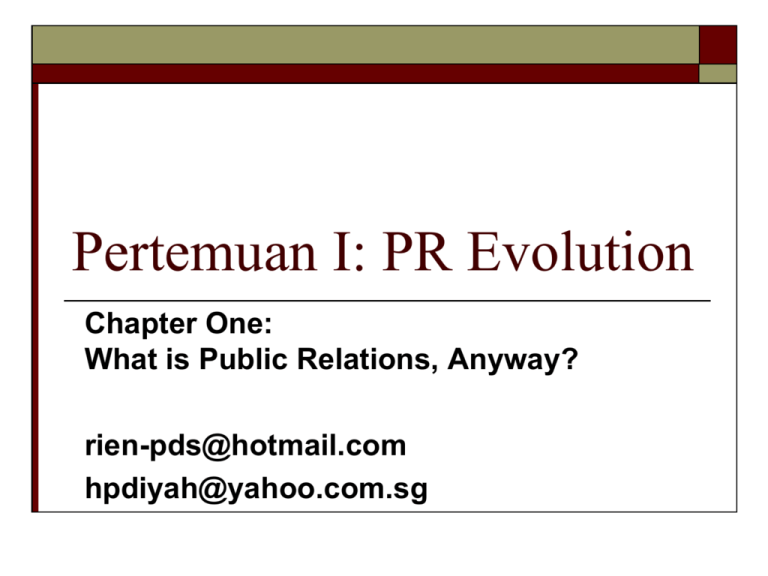
Pertemuan I: PR Evolution Chapter One: What is Public Relations, Anyway? rien-pds@hotmail.com hpdiyah@yahoo.com.sg Source: Seitel PR EVOLUTION 2 Public relations defined Classic definition: Creating an understanding for, or goodwill toward a company, person or product Edward Bernays‘ definition, 1961: ―The three main elements of public relations are practically as old as society: informing people, persuading people, or integrating people with people‖ ―Public relations‖ vs. ―PR‖— some professionals dislike ―PR‖ because it has negative ―spin‖ connotations 3 Public relations in ancient times Persuasion used to maintain power of leaders in ancient civilizations Augustus Caesar built statues of himself Julius Caesar: commentaries written as propaganda ―Propaganda‖ originated by Vatican: ―Congregation for Propagation of the Faith‖ First propaganda ministry created by National Assembly of France in 1792 4 Public relations in early America American Revolution pamphleteers: Ben Franklin, Sam Adams Federalist Papers: Writings supporting ratification of the Constitution (Alexander Hamilton, James Madison, John Jay writing anonymously) P. T. Barnum: ―The Greatest Show on Earth‖ Publicity stunts 5 The press and public relations Business either ignored or worked with the press until muckraking era Muckraking: Investigative reporting that uncovered unsavory business practices (McClure‘s and Collier‘s) Tarbell: exposé on Standard Oil Company Upton Sinclair: The Jungle exposed meat packing plants Companies must respond to allegations 6 Beginnings of corporate public relations Development tied to struggle of American labor Edison‘s General Electric vs. Westinghouse Carnegie-Frick Steel Company strike (1892): strike broken, but union won public opinion Standards for power generating/ transmission system: Direct current (DC) vs. alternating current (AC) Used former newspaper reporters as publicists; AC eventually won because of superior technology Edison tried convince public that AC was unsafe, patented electric chair; even used ―to Westinghouse‖ to refer to electrocution by alternating current Association of American Railroads claimed to be first to use term ―public relations‖ 7 Founders of public relations The Publicity Bureau (1900) Ivy Ledbetter Lee First publicity firm, Boston Employed by railroads to oppose regulation Former reporter, opened NY office with George F. Parker Didn‘t use term ―public relations‖ Believed that corporations should not conceal truth from press and business leaders should not shun publicity 8 Lee‘s Declaration of Principles (1906) Lee mailed ―Declaration of Principles‖ to newspaper editors to counter hostility Work done in the open Supply news about business and public institutions Honest and accurate information; assist editors in verification Not advertising agency Most famous clients Pennsylvania Railroad John D. Rockefeller 9 Lee‘s public relations practice Went to work for Rockefeller full-time (dissolved firm) Countered negative publicity of Ida Tarbell‘s Standard Oil investigation Advised Rockefeller on countering negative publicity following Ludlow Massacre: strike in Colorado where several miners, two women and 11 children were killed Questionable clients tarnished rep Soviet Union: attempted to get country recognized in U.S. German Dye Trust: taken over by Nazis; became known as ―Hitler‘s press agent‖ 10 Edward L. Bernays Credited with originating term ―public relations counsel‖ Worked for Committee on Public Information during WWI Wrote first books on public relations Crystallization of Public Opinion (1923); Propaganda (1928) Public Relations (1952—first public relations textbook) Impressive list of clients Procter & Gamble General Motors American Tobacco Company Taught first course on public relations Interest in mass psychology: how to influence large groups of people 11 First public relations counselor 1919: Bernays opened public relations counselor firm Ethical concerns Set up front groups for industries: ―Better Living Through Increased Highway Transportation‖— front group promoting trucking industry Used feminism to gain publicity for tobacco companies—―Torches of Freedom‖ (1929): Women march down 5th Avenue on Easter, smoking to promote ―equality‖ 12 Public relations matures Press release: invented in 1920s, written as news story Public Relations Society of America (PRSA) Founded in 1948; largest public relations association, with 20,000 members By late 1960s, several hundred public relations agencies with 100,000 practitioners In the U.S. today: 161,000 people in public relations 4,000 firms offer public relation services 13 Source: Seitel PR DEVELOPMENT 14 Public relations is a growth industry in the 21st century! In numbers: PR is a multibillion-dollar business practiced by 158,000 professionals in the U.S. alone. Employment growth is increasing faster than average through the year 2012. PR has grown rapidly across the globe, from Europe to China, Latin America to Africa. 15 Public relations growth…… In respect: A 2005 survey of Fortune 1000 company executives revealed strong support for the practice. 250 U.S. colleges and universities offer PR degree programs to more than 20,000 majors. Public Relations Society of America (PRSA) has 20,000 members in 116 chapters. 16 So what is public relations? Let‘s define the field…… 17 One definition to consider: ―Public relations is a planned process to influence public opinion, through sound character and proper performance, based on mutually satisfactory two-way communication.‖ (Seitel) 18 Another definition from PRSA: ―Public relations helps an organization and its publics adapt mutually to each other. Public relations is an organization‘s efforts to win the cooperation of groups of people.‖ 19 Public relations Corporate communications, Marketing communications The UK‘s Institute of Public Relations offers this definition of public relations: ‗The planned and sustained effort to establish and maintain goodwill and mutual understanding between an organization and its publics‘. A conference of public relations professionals in Mexico, after several days of deliberation, arrived at the following definition, popularly known as The Mexican Statement: ‗Public relations practice is the art and social science of analysing trends, predicting their consequences, counselling organization leaders, and implementing planned programmes of action which will serve both the organization and the 20 public interest‘. In essence, public relations aims to educate and inform, in order to create and increase knowledge and understanding about an organization and its operations. Although public relations is not in itself a marketing communications activity, it is an important tool used in marketing communications. 21 Its basic aim towards its target publics is to achieve changes of attitude: apathy to interest; hostility to acceptance; ignorance to knowledge; prejudice to acceptance. 22 Three basic ―publics‖ on the Public Relations Activities Primary Publics • editors; • feature writers; • journalists; • publishers; • reporters; • television and radio producers and editors; • the media. Ultimate Publics • academics; • children; • civil servants; • competitors; • customers and consumers; • distributors; • end users; • financial institutions; • general public; • governments, national, local and foreign; • health authorities; • international influencers; • investment analysts; • investors; • key opinion formers; • legislators; Internal Publics • local communities; • medical profession; • money market; • opinion leaders; • parliamentarians; • politicians; • potential employees; • resellers; • retailers; • shareholders; • stock market; • students; • suppliers; • teachers; • the professions; • trade associations; • trades unions; • wholesalers • associate companies; • employees; • management; • new employees; • verseas associates; • shareholders; • trades unions. 23 No matter how PR is defined, two elements guide the process 1. Management To succeed, PR must report to top management, unimpeded by any other group. 2. Action True PR cannot take place without ethical, consistent action. No amount of persuasion will cover up for poor performance. 24 Marston‘s four-step ―RACE‖ model describes the PR process: R = Research A = Action C = Communication E = Evaluation 25 Sharpe‘s five principles: Honest communication for credibility Openness and consistency for confidence Fairness of actions for reciprocity, goodwill 2-way communication to build relationships Research and evaluation to determine actions and adjust for social harmony 26 Public relations professionals serve as interpreters for the organization. 10-Second Quiz! Who is that lady in the blue dress, and why is she with President Bush? 27 PR professionals serve as management interpreters To publics, they interpret management‘s: Philosophies Policies Programs Practices 28 And as public interpreters To management, PR interprets the public‘s: Opinions Needs Desires Management needs to know what the public thinks about the organization and its practices! 29 Now it’s your turn…… Can you think of recent events in which organizations were not correctly interpreting public views? 30 The ―publics‖ of public relations Practitioners must communicate with many different publics at once. Each public has its own special needs, media habits, and communication requirements. 31 Ways to view our publics Internal or external Primary or secondary Traditional and future Proponents, opponents, and the uncommitted 32 Ways to view our publics…… Segmenting by values and lifestyles Actualizers Fulfilleds Believers Achievers Strivers Experiencers Makers Strugglers 33 Now it’s your turn…… Who makes up the publics at your college or university? How many do you belong to? Are they internal or external? How can they change? 34 Public relations, marketing, and advertising…… aren‘t they all the same thing? 35 The answer is……not really! Marketing and advertising traditionally promote products and services. Public relations promotes the entire organization. 36 Functions of Public Relations They are numerous: Writing Media relations Planning Counseling Research Publicity Marketing Communications Community relations Consumer relations Employee relations Government affairs Investor relations Special publics relations Public affairs and issues management Web site development and interface 37 The curse of ―spin‖ What does the term mean to YOU? Spin equals distortion, obfuscation, or even lying Spin cannot cover up for poor performance Spin does NOT equal good public relations! 38 Becoming a PR practitioner Key knowledge areas: The field The communications process Technology Current events Business Management 39 Becoming a PR practitioner Key personal characteristics: A tendency toward communication A desire to counsel senior managers A strong base of personal ethics A willingness to take risks A positive outlook on life 40 Case Study - Martha Stewart One of the nation‘s and the world‘s best known business icons. This tough-willed, hot-tempered, blunt-speaking perfectionist had morphed from a modest upbringing to become the undisputed, multimillionaire-closing-in-onbillionaire domestic doyenne. Co-author of book: Entertaining became instant bestseller Followed with lucrative publishing ventures, producing video tapes, dinner-music CDs, TV specials, dozens of books, etc. NBC Today Show segment regular Board member of the New York Stock Exchange Lecturer charging $10,000 a pop and charging attendees $900 to attend seminars at her farm Kmart advertising/consulting contract worth $5 million. TV show, Martha Stewart Living Parlayed the program into multimillion dollar co. Martha Stewart Omnimedia (MSO) with branches in publishing, merchandising, and internet/direct commerce 41 Case Study - Martha Stewart What went wrong? Dec. 2001, Stewart sold nearly 4,000 shares of biotech co. ImClone Systems The company was run by Stewart‘s pal Samuel Waksal, who had presided over a rapid stock price ascension, due principally to the co.‘s promising cancer fighting drug, Erbitux, which had been submitted for approval to the FDA With all looking good for the co., it was surprising that toward the end of Dec., Stewart decided suddenly to unload all her shares at $60 price The next day, the FDA rejected ImClone‘s application for Erbitux The stock plummeted By selling the day before, Stewart avoided a $51,000 loss Prosecutors claimed that Stewart had learned about the FDA‘s intention from her stockbroker; the stockbroker had received an urgent call from Waksal, then relayed the information to Stewart, who immediately decided to sell (if true, would mean she acted on insider information) 42 Case Study - Martha Stewart After Waksal was sentenced to 7 years in prison and family members he had tipped off were fined, it was Stewart‘s turn Stewart was never charged with insider trading, she was charged – and convicted of lying to federal prosecutors (along with her stockbroker who also served time) What did Martha do wrong in the court of public opinion? What key public relations principles did Martha Stewart violate? Had you been advising her, what PR strategy and tactics would you have recommended? How vocal should she be? How important, from a PR perspective, was her decision to go to jail early? What PR strategy should she adopt now? 43 Should she acknowledge that she made a mistake? Case Study - Martha Stewart Martha Stewart lost everything – her position, her company, her investment assets, her reputation, and her freedom – primarily because she failed to listen to common sense public relations advice. What Martha Stewart should have done upon being confronted by the feds was acknowledge that she lied, explain that she panicked upon being faced with a crime, and plead for mercy in the court of public opinion. Instead, Martha chose to listen to her lawyers, who counseled her to keep quiet and let them handle matters in court. They did, she lost, and the Martha case became a cautionary tale for anyone faced with crisis to listen to savvy public relations counsel. 44 Case Study - Martha Stewart Answers to the questions It was most un-Marthalike. Her silence after being faced with accusations only caused people to believe she was hiding something. She couldn‘t have handled it worse. When in doubt, tell the truth. As Mark Twain said, ―It will amaze your friends and confound your enemies.‖ Recommend that she go public, acknowledge her mistake, and ask for understanding and forgiveness. Once that admission was made, Martha would have been free to continue to plead her case in public forums. It was the first right decision she made. And it helped turn the tide on public opinion. Finally, she decided to confront the situation in a realistic way. Martha ought to explain fully what happened in the ImClone situation. She ought to set the record straight and keep moving forward with her various projects. The truth shall set her free. 45 Yes
